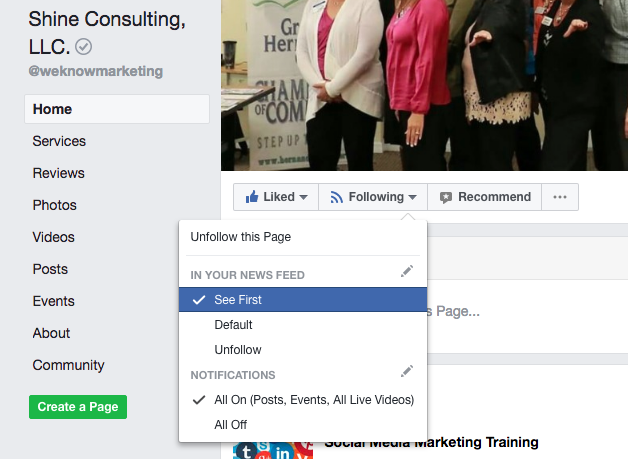You could almost hear the clamor of social media managers everywhere last Thursday. That was January 11th, BTW. Mark Zuckerberg announced Facebook changes to its algorithms. Why the panic? Because it will affect the way your followers see your content on business pages. It’s impossible to know this early how these changes will affect you. We know what these Facebook changes are intended to do, so we can help. This article will help you improve what we’re all already doing on Facebook.

An algorithm is an unambiguous specification of how to solve a class of problems. Algorithms can perform calculation, data processing, automated reasoning, and other tasks. For search engines, it processes relevant results based on search criteria
How does the new algorithm work?
There are 4 key factors that will affect the Facebook changes. These factors are calculated into the new algorithms.
- Who posted the content
- What is the content
- When was it published
- What was the engagement
What is Facebook’s new core values?
Facebook has released its new News Feed Core Values. This is why we are experiencing Facebook changes. These are simple descriptions of the new direction of what each user’s News Feed should be:
- Friends and family, prioritized
- Informative
- Entertaining
- Full of ideas
- Posts that are authentic
- Focused on your usage habits
How will this affect you?
We suspect that many brands will not see a significant difference. So far, we have not. If anything, this will be helpful to users. The main goal, as we interpret it, is to reduce click-bait posts. We also expect users to start seeing content more relevant to their own life. Part of the Facebook changes will be learning your habits of using technology. That will then be applied to your experience in using Facebook. As a business, you’ll be forced to have a little more intent with your social media strategy. We believe from our own experimenting that this will be relatively easy.
Strategizing Facebook changes
Content, Content, Content!
The more your viewers interact, the better your rankings will get. You want people to “like”, share, and comment. In return, you should be commenting back, and interacting. We recommend making sure your posts meet at least 2 of the following criteria:
- Are your posts educational?
- Is your content relevant to your followers?
- Does your post contain a picture or meme?
- Do your posts ask questions?
- Is there a call to action?
- Is your post fun?
- Will your post inspire “meaningful engagement”?
- Are you using hashtags (properly)?
- Is there a video?
Remember to avoid click-bait headlines. Click-bait is a headline designed to make readers want to click on the link. The content contained is not relevant, not of interest to your page’s viewers. Celebrity gossip posts are common examples of clickbait.
Remember to avoid click-bait headlines. Click-bait is a headline designed to make readers want to click on the link. The content contained is not relevant, not of interest to your page’s viewers. Celebrity gossip posts are common examples of clickbait.
This image is another example. This link navigated you to an advertisement for a food restaurant in California. The content was completely irrelevant from the headline. The information received was not the information the user was looking for.
“Pages making posts that people generally don’t react to or comment on could see the biggest decreases in distribution. Pages whose posts prompt conversations between friends will see less of an effect.” – Mark Zuckerberg, commenting on the proposed Facebook changes
Share these changes with your followers
Your followers will still see your content, they just may see it less easily. You should still encourage people to “like” your business page. Followers can adjust their settings so they can see your content first. If your content is of quality, they’ll do this. When you do share these changes, remind your audience they can adjust that setting easily.
Consider Ads
Yes, we know that we all have this same thought. Facebook changes are designed to boost ad money. We believe that is only part of the reasoning. If you are already doing ads, you may need to up your budget to stay ahead. If you don’t do ads, you should at least become familiar with how they work. We don’t do sponsored posts either. We prefer organic engagement by our targeted audience. This doesn’t mean we think it’s a bad idea. We just prefer to do without the ads. Organic reach has never been easy. That’s why we really don’t think this is a trick to push all brands in this direction.
Leverage Facebook Live Videos
Facebook changes made last year included heavy benefits to Live videos. Videos are content, so the same rules apply. Remember the checklist above? Your Facebook Live Stream should include at least 2 of those criteria. Minus the hashtags. Don’t be afraid to get creative. Don’t be afraid to experiment with them.
“live videos often lead to discussion among viewers on Facebook—in fact, live videos on average get six times as many interactions as regular videos.” – Mark Zuckerberg
Use Groups
We’d be surprised to find a single user, not in any Facebook groups. It’s being in the right groups that’s the tricky part. Seek out groups that can help grow your brand on multiple levels. Share your relevant content within those groups. Be sure that you interact in return. Consider what groups will put you in contact with your local market best. What groups will help you grow and gain insight the best? Where can you connect the most with people who are looking for the information you can provide?
Don’t wait
Facebook changes are here. Now. Don’t wait to start strategizing your improvements. If you have questions you’d like to chat with us about, Let’s Talk!


